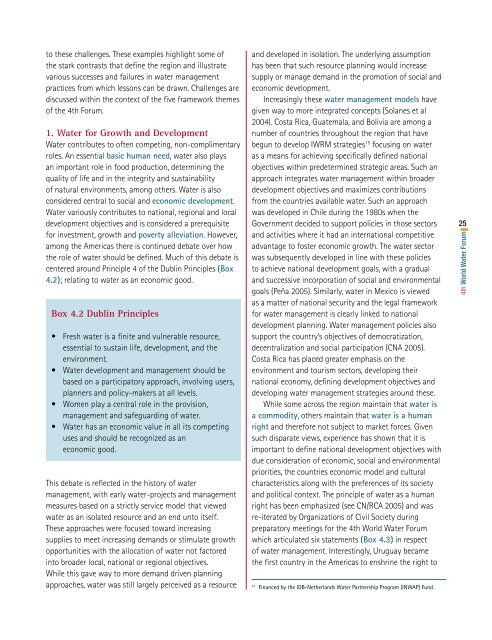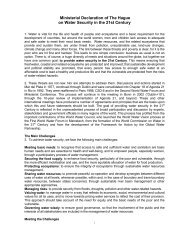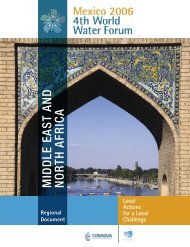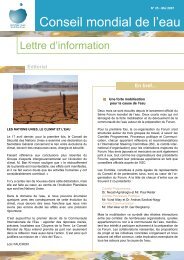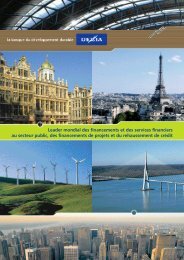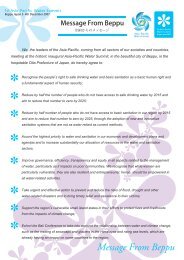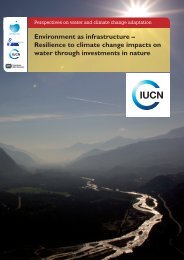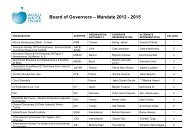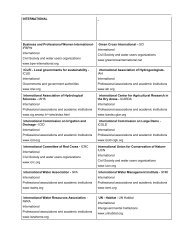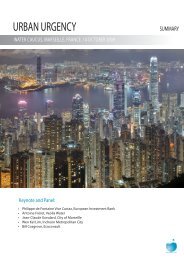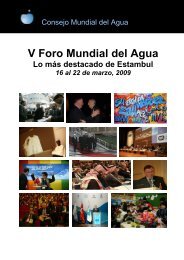Americas ok.indd - World Water Council
Americas ok.indd - World Water Council
Americas ok.indd - World Water Council
Create successful ePaper yourself
Turn your PDF publications into a flip-book with our unique Google optimized e-Paper software.
to these challenges. These examples highlight some ofthe stark contrasts that define the region and illustratevarious successes and failures in water managementpractices from which lessons can be drawn. Challenges arediscussed within the context of the five framework themesof the 4th Forum.1. <strong>Water</strong> for Growth and Development<strong>Water</strong> contributes to often competing, non-complimentaryroles. An essential basic human need, water also playsan important role in food production, determining thequality of life and in the integrity and sustainabilityof natural environments, among others. <strong>Water</strong> is alsoconsidered central to social and economic development.<strong>Water</strong> variously contributes to national, regional and localdevelopment objectives and is considered a prerequisitefor investment, growth and poverty alleviation. However,among the <strong>Americas</strong> there is continued debate over howthe role of water should be defined. Much of this debate iscentered around Principle 4 of the Dublin Principles (Box4.2); relating to water as an economic good.Box 4.2 Dublin Principles• Fresh water is a finite and vulnerable resource,essential to sustain life, development, and theenvironment.• <strong>Water</strong> development and management should bebased on a participatory approach, involving users,planners and policy-makers at all levels.• Women play a central role in the provision,management and safeguarding of water.• <strong>Water</strong> has an economic value in all its competinguses and should be recognized as aneconomic good.This debate is reflected in the history of watermanagement, with early water-projects and managementmeasures based on a strictly service model that viewedwater as an isolated resource and an end unto itself.These approaches were focused toward increasingsupplies to meet increasing demands or stimulate growthopportunities with the allocation of water not factoredinto broader local, national or regional objectives.While this gave way to more demand driven planningapproaches, water was still largely perceived as a resourceand developed in isolation. The underlying assumptionhas been that such resource planning would increasesupply or manage demand in the promotion of social andeconomic development.Increasingly these water management models havegiven way to more integrated concepts (Solanes et al2004). Costa Rica, Guatemala, and Bolivia are among anumber of countries throughout the region that havebegun to develop IWRM strategies 15 focusing on wateras a means for achieving specifically defined nationalobjectives within predetermined strategic areas. Such anapproach integrates water management within broaderdevelopment objectives and maximizes contributionsfrom the countries available water. Such an approachwas developed in Chile during the 1980s when theGovernment decided to support policies in those sectorsand activities where it had an international competitiveadvantage to foster economic growth. The water sectorwas subsequently developed in line with these policiesto achieve national development goals, with a gradualand successive incorporation of social and environmentalgoals (Peña 2005). Similarly, water in Mexico is viewedas a matter of national security and the legal frameworkfor water management is clearly linked to nationaldevelopment planning. <strong>Water</strong> management policies alsosupport the country’s objectives of democratization,decentralization and social participation (CNA 2005).Costa Rica has placed greater emphasis on theenvironment and tourism sectors, developing theirnational economy, defining development objectives anddeveloping water management strategies around these.While some across the region maintain that water isa commodity, others maintain that water is a humanright and therefore not subject to market forces. Givensuch disparate views, experience has shown that it isimportant to define national development objectives withdue consideration of economic, social and environmentalpriorities, the countries economic model and culturalcharacteristics along with the preferences of its societyand political context. The principle of water as a humanright has been emphasized (see CN/RCA 2005) and wasre-iterated by Organizations of Civil Society duringpreparatory meetings for the 4th <strong>World</strong> <strong>Water</strong> Forumwhich articulated six statements (Box 4.3) in respectof water management. Interestingly, Uruguay becamethe first country in the <strong>Americas</strong> to enshrine the right to15Financed by the IDB-Netherlands <strong>Water</strong> Partnership Program (INWAP) Fund.254th <strong>World</strong> <strong>Water</strong> Forum


